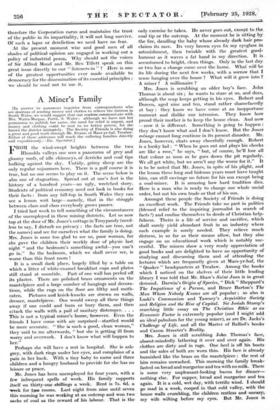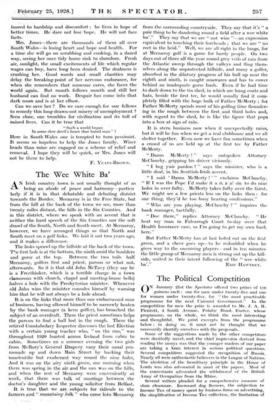A Miner's Family
[In answer to numerous inquiries from correspondents who are desirous of sending money and clothes to relieve the distress in South Wales, we would suggest that our readers communicate with Mrs. Watts-Morgan, Forth, S. Wales : although we 'have not her permission to publish her name, the need for relief is urgent, and money and clothing could be sent to no better person, for she knows the district intimately. The Society of Friends is also doing a great and good work through Mr. Evans, of Maes-yr-haf, Trealaw. Either of these addresses will reach the suffering families directly and expeditiously:—En. Spectator.] FROM the wind-swept heights between the two Rhondda valleys one sees a panorama of grey and gloomy roofs, of idle chimneys, of derricks and coal tips hulking against the sky. Untidy, grimy sheep are the only regular sojourners here. There is a golf course it is true, but no one seems to play on it. The scene below is also one of stagnation. Spread out at one's feet is the history of a hundred years—an ugly, wretched story. Students of political economy need not look in books for their facts : from any hill-top in South Wales they can see a lesson writ large—namely, that in the struggle. between class and class everybody grows poorer.
I tried last week to tell something of the circumstances of the unemployed in these mining districts. Let us now tap at the door of Mr. Jones's cottage in Tonypandy (need- less to say, I disturb no privacy : the facts are true, not the names) and see for ourselves what the family is doing.
Mrs. Jones is none too glad to see us, poor woman, for she gave the children their weekly dose of physic last night " and the bedroom's something awful—you can't - go in." So the bedroom, which we shall never see, is worse than this front room !
It is a small dark place, largely filled by a table on which a litter of white-enamel breakfast cups and plates still stand at noontide. Part of one wall has peeled off its plaster. There are polished brass ornaments on the mantelpiece and a large number of hangings and decora- tions, while the rugs on the floor are filthy and moth- eaten. Pictures and knick-knacks . are strewn on walls, dresser, mantelpiece. One would sweep all these things away if one could and burn or bury them, and- then attack the walls with a pail of sanitary distemper. . . . This is not a typical miner's' htmse,--however. Even the friends I- have come- with are surprised—startled would be more accurate. " She is such a good, clean woman," they said to me afterwards, " but she is getting ill from worry and overwork. I don't know what will happen to her."
Perhaps she will have a rest in hospital. She is ash- grey, with dark rings under her eyes, and complains of a pain in her back. With a tiny baby to nurse and three children and a hungry husband to provide for she has no leisure or peace.
Mr. Jones has been unemployed for four years, with a few infrequent spells of work. His family supports itself on thirty-one shillings a week. Rent is 75. 6d. a "reek for Imo rooms. Last night -from nine until seven this morning he was -working at an outcrop and won two sacks of coal as the reward of his labour. That is the only exercise -he- takes. He never goes out, except to the. coal tip or the outcrop. At the moment he is sitting by.
the fire, dandling the baby whose already- dark hair pro- claims its race. Its very brown eyes fix my eyeglass in astonishment, then twinkle with the greatest gnod- humour as it waves a fat hand in my direction. It is accustomed to bright, clean things. Only in the last day; or two has a change come over the home. What will be its life during the next few_ weeks, with a sorrow that I sense hanging over the house ? What will it grow into ?
A miner ? A millionaire ? - Mrs. Jones is scrubbing an older boy's face. John Thomas is about six ; he wants to stare at us, and does, although the soap keeps getting in his eyes. Robert and Doreen, aged nine and ten, stand rather shamefacedly at bay : they know we have come at an inopportune moment -and dislike our intrusion. They know how proud their mother is to keep the house clean. And now —now it is different. Something is going to happen : they don't know what and I don't know. But the Jones ménage cannot long continue in its present disorder. Mr. Jones, however, chats away cheerfully enough. Robert is a husky lad : " When he goes out and plays his cheeks are like a rose," he says, " but, of course, he'll lose all that colour as soon as he goes down the pit regularly. We all get white, but we aren't any the worse for it." It is to be noted that Mr. Jones, in spite of his plight, and the lesson these long and hideous years must have taught him, can still envisage no future for his son except being a coal-miner. It is amazing how hard tradition dies. Here is a man who is ready to change our whole social order, but not his own trade or that of his son.
Athongst these people the Society of Friends is doing an excellent work. The Friends take no part in politics (blessed relief to the inquiring journalist in search of facts !) and confine themselves to deeds of Christian- help- fulness. theirs is a life of service and sacrifice, which shall surely yield abundant fruit in an industry where such example is sorely needed. They relieve much distress, in so far as their means allow, but they also engage on an educational work which is notably suc- cessful. The miners show a very ready appreciation of good books and are delighted to have an oppOrtunity of studying and discussing them and of attending the lectures which are frequently given at Maes-yr-haf, the " Quaker " headquarters at Trealaw. Among the books- which I noticed on the shelves of their little lending library I was told that Mr. Shaw's Saint Joan is in great demand. Darwin's Origin of Species, " Dick " Sheppard's The Impatience of a Parson, and Bruce Barton's The Man Whom Nobody Knows are all popular ; so also is Laski's Communism and Tawney's Acquisitive Society. and Religion and the Rise of Capital. Sir Josiah Stamp's searching little essay on The Christian Ethic as an - Economic Factor is-extremely popular (and I might add- an ideal pabulum for the young miner), as are Dr. Jacks's Challenge of Life, and all the Master of Balliol2s books and Canon Streeter's Reality.
Mrs. Jones is still scrubbing John Thomas's face, absent-mindedly lathering it over and over again. His clothes are dirty and in rags. One heel is off his boots and the soles Of both are worn thin. His face is already burnished like the brass on the mantelpiece : the rest of him remains unwashed. This morning the family break- fasted on bread and margarine and tea with no milk. There is some very unpleasant-looking bacon for dinner— nothing else.- For supper, bread and margarine and tea again. It is a cold, wet day, with terrific wind. I should go mad in a week, cooped in that cold valley, with the house walls crumbling, the children restless and uneasy, my wife wilting before my- eyes. But Mr. Jones is inured to hardship and discomfort : he lives in hope of better times. He dare not lose 'hope. He will not face facts.
Mrs. Jones—there are thousands of them all over South- Wales—is losing heart-and hope and health. For a time she will go on scrubbing and cooking, in a dazed way, seeing her once tidy home sink to slumdom. Fresh air, sunlight; the small excitements of life which regular wages can buy, have long been denied. The drabness is crushing her. Good words and small charities may delay the breaking-point of her nervous endurance, for when she remembers that someone cares, she faces the world again. But month follows month and still her i husband can find rio work. Despair has come into that dark room and is at her elbow.
Can we save her ? Do we care enough for our fellows to remedy this long-drawn-out misery of unemployment ? Seen close, one trembles for civilization and its toll of - ruined lives. Can it be true that
" Such a world began In some slow devil's heart that hated man "
Here in South Wales one is tempted to turn pessimist. It seems so hopeless to help the Jones family. Wiser heads than mine are engaged on a scheme of relief and removal. I hope they will be quick, or Mrs. Jones will not be there to help.
F. TEATS-BROWN.









































 Previous page
Previous page